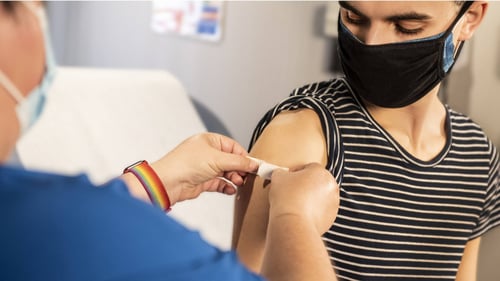What Workplaces Need To Know About Requiring Vaccines For Their Employees
Can workplaces require their employees to get inoculated? This may be the question of the year. With so much at stake, heartache and progress towards normalcy alike, companies are now dealing with the challenge of whether or not they will require their employees to get a vaccination in order to return to the office.
So how are tech companies handling the dilemma? Just last month, Facebook announced that all U.S. employees must be vaccinated to go to the office, and Google is in the midst of expanding plans to bring its vaccination drive to other regions. Soon after these announcements, Netflix followed suit, mandating vaccinations for all cast and crew members on its productions in the US, and Apple is once again requiring masks again for staff and costumers, regardless of vaccine status.
Bogged down by the news cycle's concerns about the Delta variant, businesses now must grapple with the decision to extend remote work, likely the safest option, or require that employees protect themselves if they are returning to work in person. As the 'giants' and other tech companies weigh this decision, many are also closely monitoring the FDA's official approval of the vaccine, which could happen very soon. According a survey from the Kaiser Family Foundation, "three in ten unvaccinated adults said they would be more likely to get vaccinated if one of the vaccines moves to full approval."
While there is no exact date for approval on the books, this could change the way people feel about the vaccine in general. In this post, we’ll take a closer look at the legality around requiring and asking about vaccines, and what options businesses have when it comes to approaching this tricky subject.
How Are Companies Approaching Vaccine Requirements?
Long story short, it is legal for businesses to require their employees to get a vaccine. Similar to state public education requirements for children and their vaccination status for other viruses such as measles and chicken pox, it is within a company’s legal right to create a policy that protects the health of everyone who works there.
With the current uncertainty and resurging rise of COVID cases, businesses are coming up with creative strategies to elongate time spent in the office without putting their staff at further risk. For employers thinking about requiring vaccines, the Equal Employment Opportunity Commission, or EEOC, states that those policies must comply with the ADA, the Americans Disabilities Act, Title VII of the Civil Rights Act of 1964, and other federal and state workplace laws that protect against discrimination.
What this means is that if getting a vaccine goes against an employee’s religious beliefs or is unsafe for them due to medical reason that they can document, a company must provide accommodations for the employee to work safely being unvaccinated. So, while you can require your employees to get vaccinated, the decision comes with a few caveats to consider.
What Goes Along With Requiring Vaccines In The Workplace?
If you do decide to require vaccines for being in the office, make a plan to respond to people’s questions, fears, and specific situations with consistent answers and policies. For example, an employee with reason to opt-out of getting vaccinated could be allowed to continue working remotely, adhere to a mask policy, or have their desk apart from others at work. But this leads into another point of consideration, to what extent will accommodations be available?
While some companies are taking a “get it or get out” mentality when an employee without a legally protected exemption wants to opt-out, others fear the backlash of implementing a mandate. This is why many are trying to introduce more flexible policies like opting in to masking or continued remote work. Which begs the question, is there a legal and savvy way companies can get feedback on new policies and answers on vaccination status without prying or crossing a legal line with employees and candidates?
Technically speaking, questions about someone’s vaccine status cannot be asked until after an offer has been made to that candidate. It’s important to note that while it’s legal to ask about someone’s vaccine status as an employer, questions that go beyond yes or no can push into the territory of asking for private information. Stephen Riga, a policy attorney in Indianapolis, explained that essentially, "the EEOC said you can ask about vaccination status, but employers should refrain from asking follow-up questions about why an employee did not receive a vaccination. Such inquiries may elicit disability-related information, according to the EEOC, and would be subject to the ADA's requirement that questions be ‘job-related and consistent with business necessity.’”

If the policy is understood, accepted, and an unvaccinated individual plans on getting the vaccine, the employer must also arrange a start date that is two full weeks after that individual’s second shot of the vaccine. For the most common vaccine types, Pfizer and Moderna, an individual is considered fully vaccinated two weeks after their second dose of the vaccine, allowing it time to take effect and build COVID-fighting antibodies.
Additionally, if a company plans to require vaccines, it’s crucial that they create a written statement outlining this policy fully. Andrew Maunz, former EEOC legal counsel who oversaw the agency's COVID-19 guidance explains that employers making vaccine status a contingency of hiring could lead to an increase in accommodation requests, and “claims of discrimination by individuals under various protected bases who say they were unlawfully screened out.” He also adds, "ultimately to defend themselves, employers will likely have to show that their vaccination policy is job-related and consistent with business necessity."
Overview:
- Companies requiring vaccines can ask about status, but must be cautious about other questions
- If a new employee plans to get vaccinated before starting work, their start date needs to be two-weeks after their last dose to ensure efficacy.
- Businesses need a written statement that clearly outlines the policy and reasons why requiring vaccines is job-related or a business necessity.
Other Important Points To Consider On Vaccines In The Workplace
Be Transparent With Your Employees & Candidates
In the hiring process, it benefits employers and candidates to have transparent information about vaccine requirements. If possible, these requirements should be outlined in a job listing, as well as a section on any potential accommodations that will be considered for those that cannot comply due to other reasons. This will save companies time and allow candidates to make a decision accordingly before getting too far in the interview process.
Prepare To Adapt On Previously Made Decisions
As we are all too familiar with, guidelines and regulations surrounding COVID are always evolving. Whether through your HR department or through a consulting firm, it’s important for businesses to ensure that they are up to date on recent mandates and being compliant with all local and federal laws. Understanding the regulations in place and having an open dialogue on these issues helps prevent confusion and frustration.
One thing is certain, conversations on this topic must happen to address the ongoing situation with COVID-19 and its variants. Another consulting attorney for the EEOD stresses, "employers considering mandating vaccines should give very serious consideration to this issue; if a significant portion of the workforce refuses to comply, the employer may be put in the very difficult position of either adhering to the mandate and terminating all of these employees, or deviating from the mandate for certain employees, increasing the risk of discrimination claims.”
Encouraging A Vaccinated Workforce Through Creative Means
What else can be done to ease the pain points of this phase of dealing with the virus? In our research, many professionals suggested that instead of implementing hard and fast mandates that could lead to terminations and tension, they could focus on ways to educate and incentivize employees to get vaccinated on their own. This includes:
- Create a simple education and resource campaign for people to learn about the vaccine
- Offer to cover vaccine related costs, hours missed to get the vaccine, or any other financial incentive
- Have someone in HR or from your admin team help people setup and find appointments to get vaccinated
- Offer additional paid time off or extra vacation days for those willing to get vaccinated

Our Role As Your Staffing Partner
Working as an extension of the brands we represent, it’s our role as a staffing partner to pass along expectations surrounding the vaccine, while considering the limits of asking candidates personal and private information. To be plain, we can state, making the distinction between ‘stating’ and ‘asking’, that getting vaccinated is a requirement for in person office work, that in person office work is required for a role, and that the company is requiring documentation.
However, beyond that the company must complete the loop in translating those expectations to potential candidates and current employees. Any information a candidate wishes to disclose is their decision, and while they may offer that information freely, asking additional questions could be construed as discrimination for someone’s disability status or personal choices.
Notably, any documentation of vaccination status, like vaccination cards, must be held within the company’s records, and kept like any other health documentation with consideration of sensitive information and privacy. As policies and procedures on COVID-19 are still in a state of flux for all employers, we will continue to update this post as new information comes about.
Here at BWBacon Group, we know and live what you are experiencing as an employer or job seeker in Denver, Boulder, Dallas, San Francisco, New York City or any of the other cities we work in. We believe great recruiting starts and ends with understanding people.
If you have any questions about living, working or playing any of the areas we serve, please contact us. We are happy to help. Seize the day, every day, that’s what we say!
